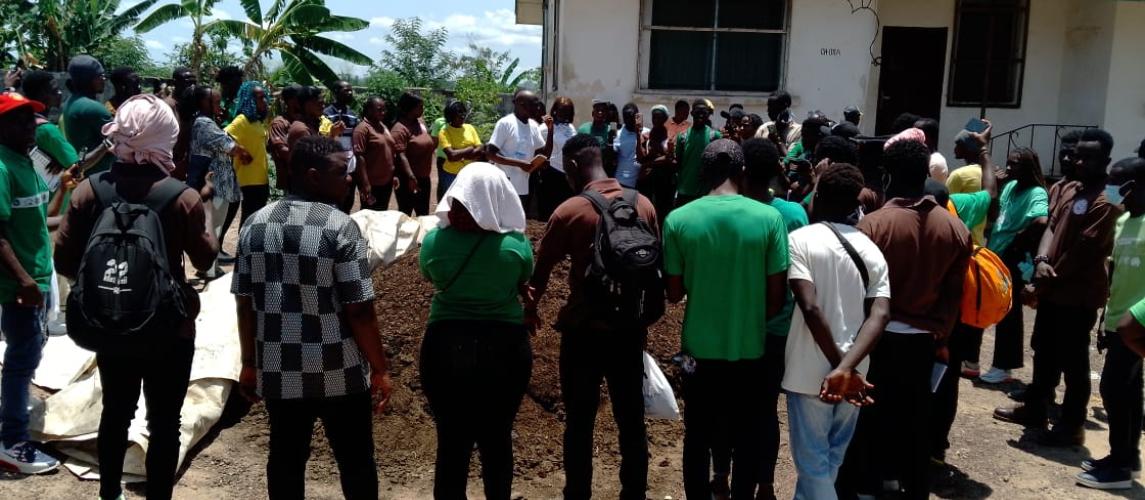
CARI’s Natural Resource Management Program Advancing Agricultural Research Engages University of Liberia Students
Suakoko, Bong County – Liberia | May 8, 2025 The Natural Resource Management Program at the Central Agricultural Research Institute (CARI) remains at the forefront of sustainable agricultural innovation, making significant strides in enhancing productivity through cutting-edge research and implementation.
As part of its ongoing commitment to knowledge-sharing, CARI hosted a group of students from the University of Liberia College of Agriculture and Forestry in May 2025. The visit provided students with firsthand exposure to various research programs, including crops, biotechnology and genetic resources, mechanization, irrigation and irrigation engineering, post-harvest and food processing, livestock, natural resource management, aquaculture, and inland fisheries.
Welcoming the students, Dr. Arthur Bob Karnuah, Director General of CARI, on engagement and knowledge transfer, emphasized the importance of academic focus and engagement. He urged them to make the most of the learning opportunity, stating, “You have to pay attention and do away with picture-taking for Facebook, and pay attention to note-taking.” His remarks underscored the value of in-depth inquiry and active participation in agricultural research.
Exploring climate-resilient agriculture, a key highlight of the visit was an interactive session with the Natural Resource Management Program, led by Acting Head of Program Harris Yanquoi, and his team. The session focused on climate-resilient agricultural practices, including the production of biofertilizers and biopesticides and advanced techniques aimed at improving soil fertility and overall crop productivity.
In the summary of key accomplishments by the Natural Resource Management Program from March to June 2025, sustainable soil management and fertility enhancement, the program has been conducting soil diagnosis with improved technology, and advanced soil assessment techniques are being implemented to improve agricultural sustainability and optimize yields. Also, the program, working with integrated Soil Fertility Management (ISFM), this strategies were developed and applied to enhance soil health and strengthen the growth of crops in farmers’ fields.
The Plant Pathologist, explaining that the program is involved with climate-smart agricultural innovations, said biofertilizer is produced when formulated natural fertilizers are used and can boost soil nutrient levels. “Biopesticide production introduces eco-friendly pest management solutions to reduce dependency on harmful chemicals.” For the liquid organic fertilizer application, it is a developed, tested, and it is an organic solution that enriches soil and improves crop nutrition.
For apiculture development, the program has established 20 beehives in the CARI natural forest to promote beekeeping as a biodiversity conservation and economic activity, and has also laid the groundwork for a nutrient omission trial (NOT) across 50 commercial farmers’ fields in Liberia, ensuring data-driven approaches to soil management, including the SAEL-CARI Project which has launched 34 acres (14 hectares) of demonstration plots for seed multiplication in Grand Cape Mount County, supporting increased crop productivity. The cassava genetic conservation has identified and preserved 35 cassava accessions within CARI’s WAVE Project Gene Bank, securing valuable genetic resources for future agricultural development. The WAVE is the West African Virus Epidemiology Project.
The visit reinforced CARI’s mission to empower future agricultural professionals, demonstrating the institute’s leadership in research, sustainability, and practical application of innovative farming techniques. Through collaborations with academic institutions like the University of Liberia, CARI continues to drive agricultural excellence in Liberia, ensuring that students, researchers, and farmers benefit from transformative scientific advancements.
As Liberia faces ongoing agricultural challenges amid climate variability, initiatives like these remain crucial in shaping resilient farming communities and strengthening food security nationwide. These accomplishments reflect CARI’s unwavering commitment to agricultural innovation, environmental sustainability, and farmer empowerment.
As Liberia faces ongoing agricultural challenges amid climate variability, initiatives like these play a pivotal role in shaping resilient farming communities and boosting food security. These accomplishments underscore CARI’s ongoing commitment to agricultural innovation, environmental sustainability, and farmer empowerment across Liberia.
